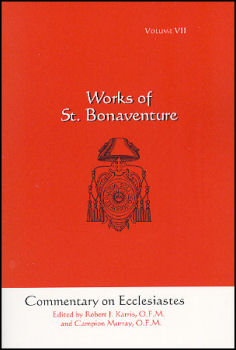
|
Posted October 6, 2005
Those who preach the scriptures beware! Bonaventure challenges us to depths in reading the scriptures most of are still striving to reach in order to be a person of the scriptures. Book: Works of St. Bonaventure: Commentary on Ecclesiastes Editors: Robert J. Karris, O.F.M., and Campion Murray, O.F.M. The Franciscan Institute, St. Bonaventure, NY, pp. 461 An Excerpt from the Jacket:
An Excerpt from the Book: Bonaventure Arrives at the Literal Sense by Interpreting Scripture by Scripture Anyone familiar with Bonaventureís Commentary on the Gospel of Luke knows that the dominant style of exegesis in that commentary focuses on the literal sense. Bonaventure arrives at the literal sense of a passage in Lukeís Gospel by means of interpreting Scripture by Scripture. He maintains that the Spirit who ultimately wrote the Scriptures must be interpreted by the Spirit of the Scriptures and by the Spirit at work in the interpreter. As Bonaventure states in his "About the Mode of Expounding Scripture" in his Breviloquium: "Scripture has this special mode of proceeding and should be understood and expounded in a way that corresponds to it. Since it hides several meanings under a single text, the expositor must bring hidden things to light. That is, once a meaning has been brought forth, to clarify it through another, more evident, scriptural passage. For instance, if I were expounding on the words of the Psalm, Take hold of arms and shield, and rise up to help me, and wanted to explain what is meant by the divine Ďarmsí, I would say that these are Godís truth and good will. I would then use a more explicit biblical passage to prove that this is so. For it is written elsewhere: You have crowned us, as with the shield of your good will, and again: His truth will compass you with a shield. No one will find this kind of thing an easy task except by long practice in reading the text and committing its literal sene to memory. Otherwise, that person will never have any real capacity to expound the scriptures. The person who is too proud to learn the letters that make up a word can never understand the meaning of those words or grammatical constructions. So, too, the one who scorns the letter of sacred scripture will never rise to interpret its scriptural meaning. Table of Contents: Chapters I - XII of the Book of Ecclesiastes |
|
